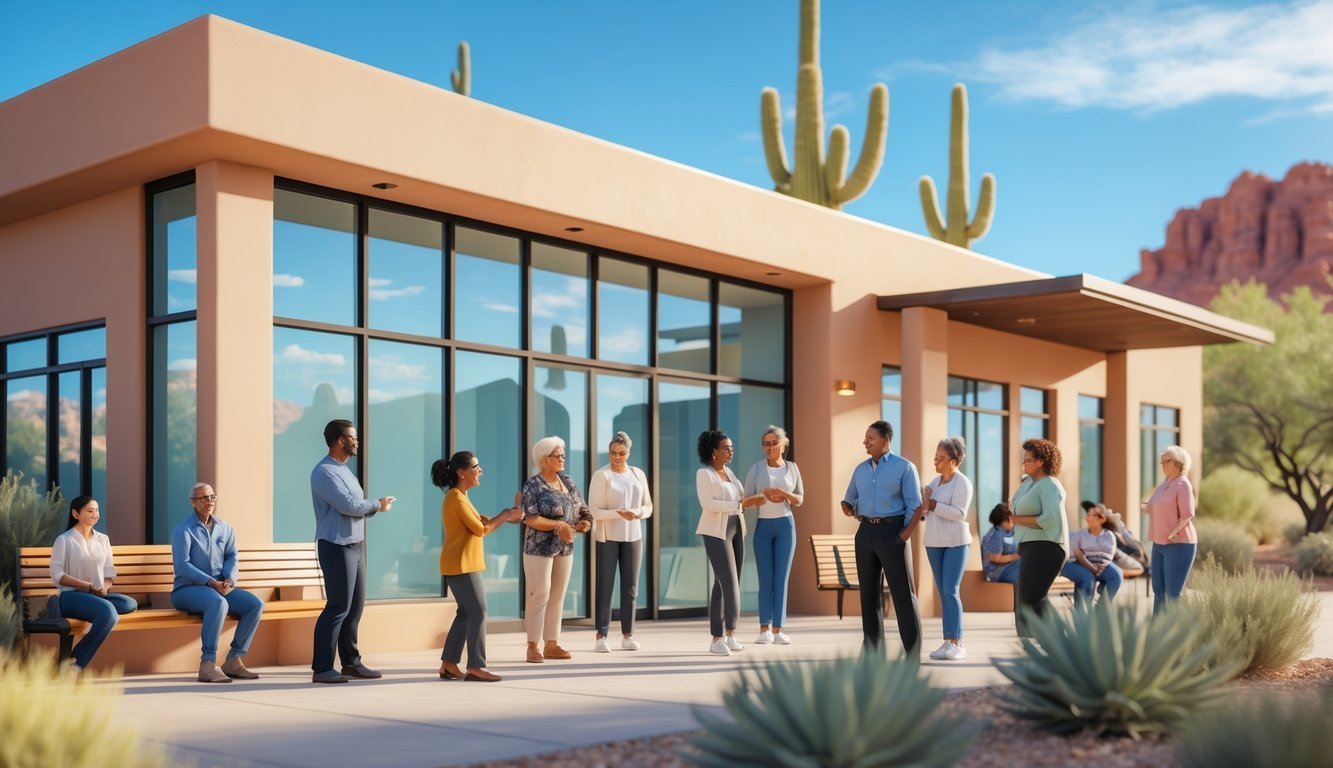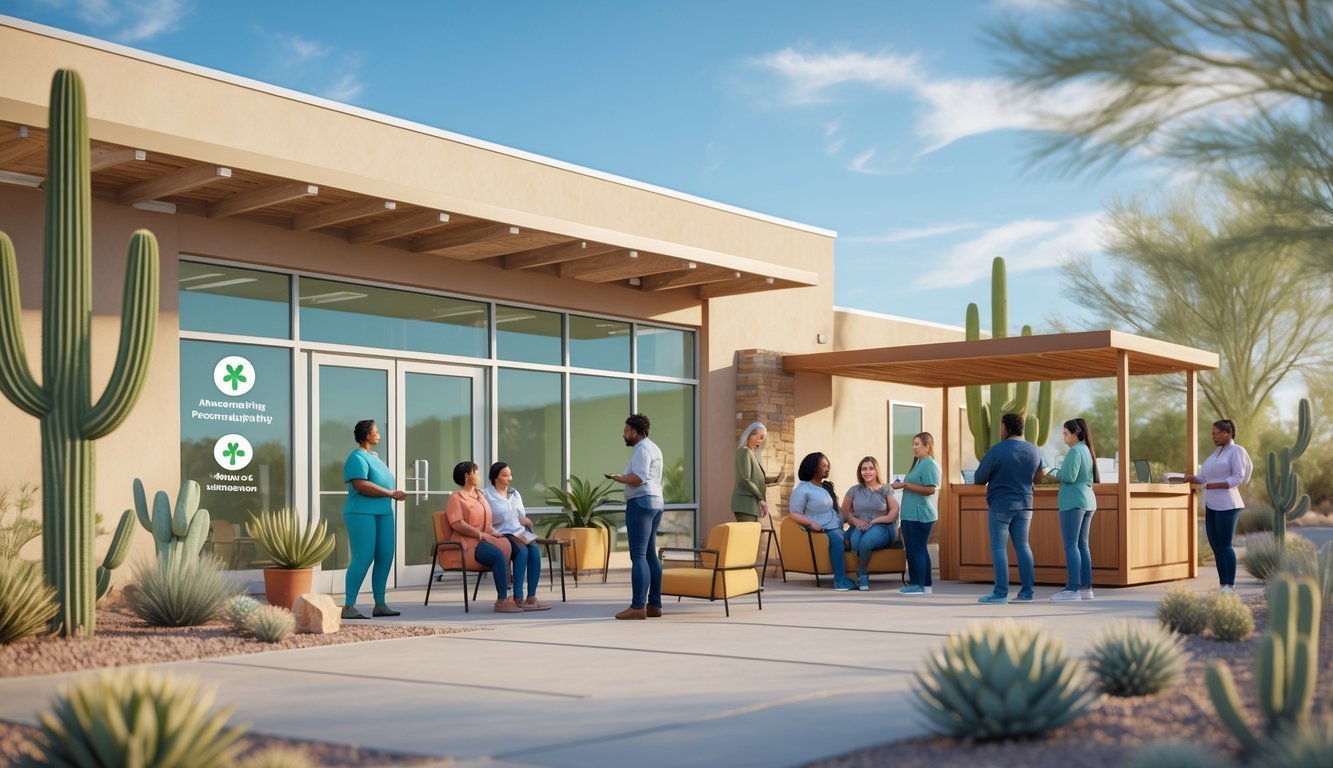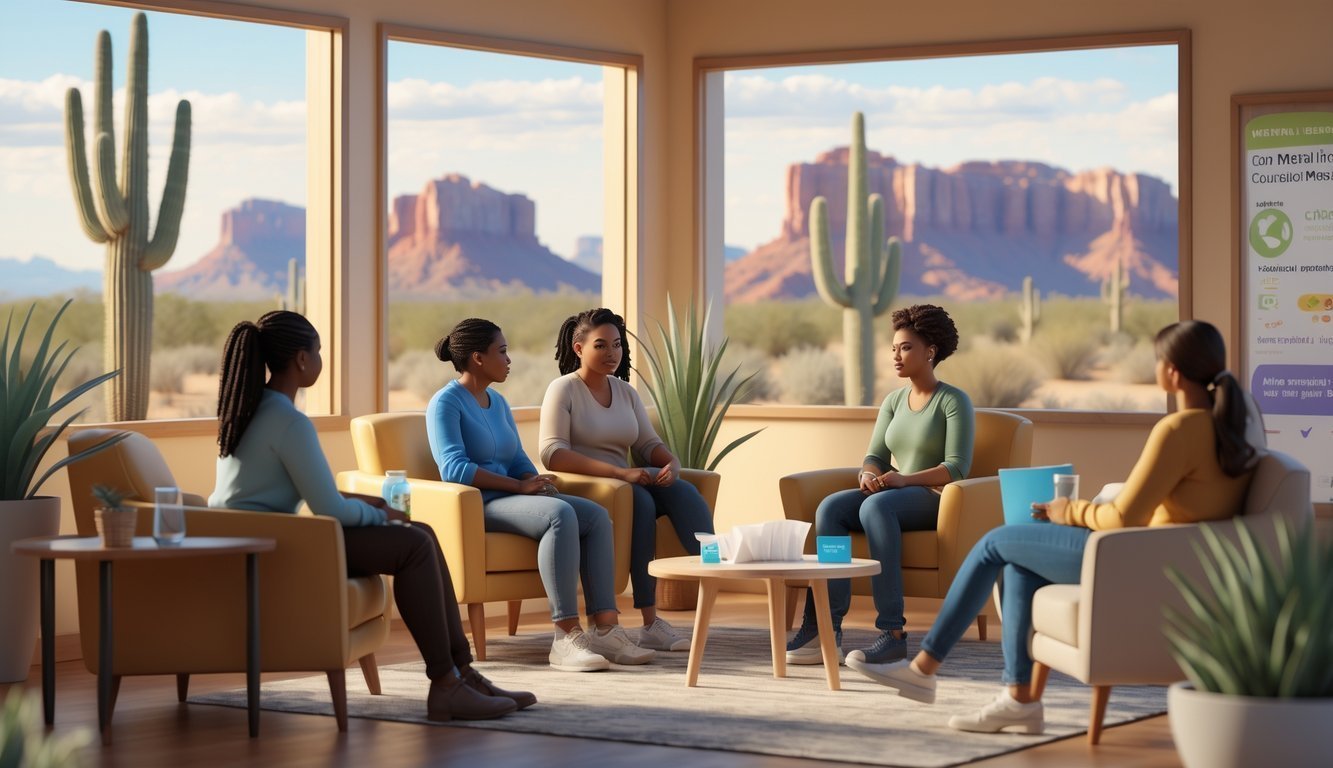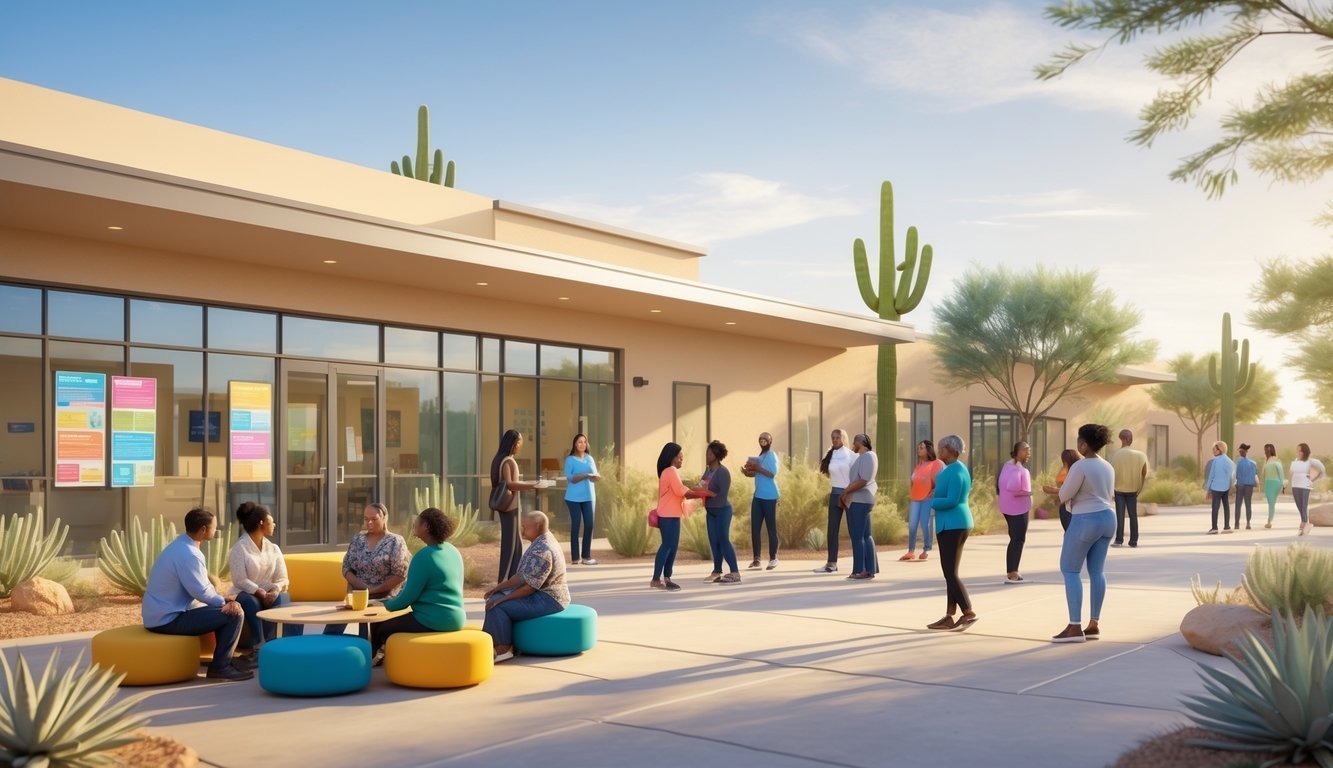PsychNewsDaily Publishers
100 Summit Drive
Burlington, MA, 01803
Telephone: (320) 349-2484
PsychNewsDaily Publishers
100 Summit Drive
Burlington, MA, 01803
Telephone: (320) 349-2484
Arizona offers a range of free and low-cost mental health services, including crisis hotlines, community centers, university programs, and state-funded clinics for residents in need.

Getting mental health support shouldn’t cost a fortune or keep you stuck on a long waitlist. Arizona has a bunch of free and low-cost mental health services through state programs, community centers, universities, and nonprofit groups spread out across the state.
You can find free mental health services in Arizona through crisis hotlines, community health centers, university counseling programs, and state-funded clinics. These places provide immediate support, no insurance needed.
Many offer same-day appointments, 24/7 crisis help, and sliding-scale fees based on what you earn.
If you need emergency intervention, ongoing therapy, or just a support group, Arizona’s network of mental health resources is pretty broad. University programs like ASU Counseling Services and specialized clinics team up with community organizations so you can find care that fits your situation.

Arizona has several free mental health programs thanks to state and federal partnerships. Most connect through AHCCCS Medicaid or university programs with income requirements.
AHCCCS (Arizona Health Care Cost Containment System) is Arizona’s Medicaid program. If you qualify, it covers mental health care at no cost.
AHCCCS pays for therapy, psychiatric evaluations, and medication management. You can get services at community health centers or with private providers who take Medicaid.
University-based programs give more free options. University of Arizona CAPS offers counseling and crisis support for students and sometimes community members.
ASU Counseling Services helps students stay in school by offering mental health support. Some of these programs even include family members.
Community mental health centers work in every Arizona county. They use sliding-scale fees based on income, and many services end up being free.
Crisis hotlines and emergency mental health services are always free for Arizona residents, no matter your insurance status.
You qualify for AHCCCS based on your household income and family size. Most adults get in if they earn less than 138% of the federal poverty level.
Pregnant women and kids have higher income limits. If you’re undocumented, you can still get emergency mental health services through AHCCCS Emergency Services.
University counseling usually requires you to be a student. Some programs include spouses and dependents.
Certain programs have age restrictions. Kids’ mental health services have different rules than adult programs.
Most state-funded programs want proof you live in Arizona. Some services only work if you live in a certain county or area.
Arizona follows federal HIPAA laws to keep your mental health info private. Your records stay between you and your provider.
Mental health providers need your written permission to share your info, unless there’s an immediate safety risk.
Crisis services keep things confidential but will share needed info in emergencies. Sometimes, they have to loop in family or emergency contacts for safety.
University counseling programs also follow FERPA, which keeps your academic records separate from mental health records.
You can ask for copies of your mental health records from any provider. Most places get them to you within about 30 days.

Getting help for mental health in Arizona isn’t as hard as it might seem. Crisis support is always available, and free counseling can be found through community centers, colleges, and healthcare organizations.
If you need help right away, crisis hotlines are there for you. The 988 Suicide & Crisis Lifeline connects you to trained counselors any time, day or night.
You can call, text, or chat online with crisis specialists. It’s always free and confidential.
Key Crisis Resources:
Many hotlines offer help in both English and Spanish. You don’t have to be in immediate danger to reach out.
Crisis counselors can talk you through anxiety, depression, relationship struggles, and more. They also help you find local resources for follow-up support.
Arizona’s colleges and universities give free counseling to students and sometimes the community. ASU Counseling Services provides same-day clinical services for students dealing with mental health issues.
University of Arizona’s CAPS program offers counseling at different campus spots. Community colleges have mental health resources through their student support offices.
Where to Look:
Many centers use sliding fees based on your income. Some don’t charge anything if you qualify.
Call ahead to ask about wait times and what you need to get started. Most places do a quick phone screening to match you to the right services.
You can meet with a counselor in person or over video. Telehealth makes it easier if you live far away or can’t get a ride.
Most free counseling programs now offer both options. For most types of therapy, video sessions work just as well as in-person.
Benefits of Each Option:
Some programs let you switch between formats as needed. You might start with telehealth and later switch to in-person.
Training clinics at counseling schools often provide free services. Students work under licensed professionals, and you can usually choose video or office visits.

Arizona has a lot of community-based mental health resources. Local support groups, peer programs, and special services for different groups all play a part.
These programs connect you with others who get what you’re going through and offer support outside the usual therapy setting.
Support groups meet regularly so people can share experiences and learn coping skills. The National Alliance on Mental Illness has info and local support groups across Arizona.
You can find groups for depression, anxiety, bipolar disorder, PTSD, and more. Many meet weekly at community centers, libraries, or hospitals.
Online Support Groups are open 24/7 for those who can’t make it in person. Some are video calls, others are chat-based.
Most support groups are free. Some focus on grief, addiction recovery, or family support.
Peer support programs connect you to people with similar mental health experiences. Trained peer specialists help you figure out services and set recovery goals.
Peer advocates work in many Arizona community mental health centers. They offer one-on-one support and help you access resources.
Peer Recovery Services include:
Peer specialists have lived through mental health challenges themselves. They really get it, and they can offer hope and practical advice.
Arizona has mental health services focused on different groups with unique needs.
Veterans get specialized mental health programs through VA centers and community groups.
LGBTQ+ folks can find affirming support groups and counselors trained in LGBTQ+ issues.
Seniors over 65 have access to age-specific support groups and services that address both mental health and aging.
Students at colleges and universities can use campus counseling centers and support programs like UTEP CARE services for mental health help.
Spanish-speaking residents can join bilingual support groups and peer services in most major Arizona cities.
Arizona’s main health insurance for low-income residents is AHCCCS. This covers mental health and substance use services.
If you meet income requirements, you can get counseling, therapy, and crisis support through AHCCCS.
AHCCCS stands for Arizona Health Care Cost Containment System. It’s Arizona’s Medicaid program, serving about 2.1 million people.
The program covers things like:
Back in 2015, Arizona merged AHCCCS with behavioral health services into one agency. This made it easier to get physical and mental health care together.
You get both inpatient and outpatient mental health care. Services are available at hospitals, clinics, and community mental health centers.
You can apply for AHCCCS online, by phone, or in person. The process checks your income and family size.
Income limits change every year. Most adults qualify if they make up to 138% of the federal poverty level. Families with kids may qualify at higher incomes.
You’ll need to show things like:
It usually takes 30-45 days to process your application. Emergency services are available while you wait.
If you make too much for AHCCCS, you might qualify for subsidized insurance through the federal marketplace. Children may qualify for CHIP if families earn too much for Medicaid but can’t afford private insurance.
Once you get approved for AHCCCS, you’ll pick a health plan. Every plan has its own list of mental health providers and counseling services.
Your health plan gives you a primary care doctor. This doctor can send you to mental health specialists if you need them.
Most plans want you to stick with their network of providers. If you go outside the network, you’ll probably pay more.
If you’re looking for mental health providers, here’s what you can do:
You can also use Colorado LIFTS or similar state resources to reach care navigators who help you find services.
Your benefits might include small copays for counseling sessions, usually $3 or less each visit.